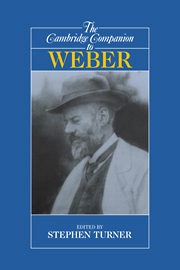1 - Rationality, economy, and society
from PART I - RATIONALITY, RATIONALIZATION, AND PSYCHOLOGY
Published online by Cambridge University Press: 28 May 2012
Summary
Introduction
The idea of rationality has a central place in Max Weber's Economy and Society. In the years since it was written, rationality has also come to be one of the most important concepts in the social sciences – not only in economics, but also in political science and increasingly in sociology. In the present article I confront some central arguments in Economy and Society, notably from the first two chapters of Part I (“Basic Sociological Terms” and “Sociological Categories of Economic Action”), with what I believe to be the standard contemporary approach. Because I know much more about the modern theories than about Weber's writings – I am not a Weber scholar – my procedure will have to be somewhat schematic. In examining passages from Weber out of their historical context and without regard for the vast secondary literature, I obviously run the risk of anachronism, oversimplification, or worse. I can only hope that the analytical arguments will be useful to those with a better knowledge of the Weberian corpus.
The article is a personal essay, in the sense that it is colored by my own interests and preoccupations. For many readers of Economy and Society, the emphasis I give to emotions and social norms will come as a surprise. Yet although Weber's discussions of these topics are brief and often extremely condensed, I believe his treatment is very acute and worth highlighting. Also, as already indicated, I shall confront Weber’s views about instrumental rationality with modern ideas from cognitive psychology and game theory that he could not possibly have anticipated.
- Type
- Chapter
- Information
- The Cambridge Companion to Weber , pp. 19 - 41Publisher: Cambridge University PressPrint publication year: 2000
- 24
- Cited by



